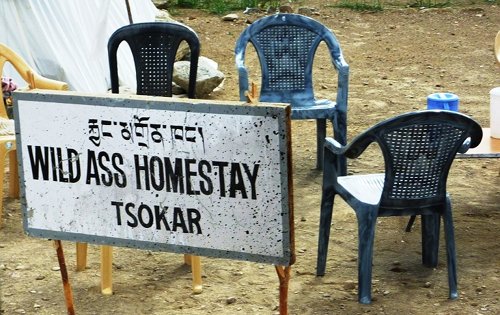Wild Ass Homestay
« previous post | next post »
John Hill kindly sent me this photograph of a sign that he took at Tsokar in Ladakh:
Intrigued by the name of the establishment, I wondered just what sort of services Wild Ass Homestay offers.
The first thing to keep in mind is that there really is a wild equid (Equus hemionus subsp. kiang), popularly referred to as the "Wild Ass," that roams over the Tibetan plateau.
The next task was to read the Tibetan correctly. One correspondent rendered it thus:
rkyang mgon khang
rkyang means a Kyang or Wild Ass.
mgon means protector or refuge.
khang means home or house
mgon+khang means a chapel housing images of the fierce protectors, a protector temple. But that may not be the meaning in this case. Probably "a protection home for kyang" or something like that?
Other correspondents corrected that as follows: rkyang mgron-khang, where rkyang means "wild ass; wild donkey" and mgron-khang signifies a hotel (general term). Hence, rkyang mgron-khang would mean something like Wild Ass Hotel / Guest House. Usually, however, this would not be a grand affair. As one Tibetologist put it, "I do not think it is a quaint little Tibetan inn cozily nestled betwixt snowy peaks with a sparkling brook purling under your rooms. It will be a hole in the wall, well, maybe just a hole without a wall!"
John Hill wrote back later to describe in more detail what the Wild Ass Homestay he stayed in was actually like: "It was just a temporary or, at best, a seasonal structure, made of second-hand Indian army parachutes with a little dabba [VHM: box] in the front and some low raised 'couches' around the main eating area covered with Tibetan carpets, with a few more in a sort of alcove off the back which one could hire to sleep on." "I think it had been hastily erected by nearby 'settled Tibetan nomads' to take advantage of the sudden increase of traffic because of the road closures. They also had an assortment of animal bones and skulls placed around which added to the forlorn atmosphere." "It was near a village called Tsokar, a rather bleak place next to a salt lake where nomads have been settled on the western edge of the Changthang [VHM: name of a high plateau in northern and western Tibet that extends into southeastern Ladakh], and somewhere to the south of the lake known as Tsomoriri, which is a popular tourist destination."
Moral of the story: words are often deceptive; better to check out the premises first-hand before booking a room.
[A tip of the hat to Robbie Barnett, Leonard van der Kuijp, Kevin Stuart, Elliot Sperling, Nathan Hill, Gray Tuttle, Mark Swofford, and Geoff Pullum}

Twitter Trackbacks for Language Log » WIld Ass Homestay [upenn.edu] on Topsy.com said,
January 30, 2011 @ 8:00 am
[…] Language Log » WIld Ass Homestay languagelog.ldc.upenn.edu/nll/?p=2932 – view page – cached January 30, 2011 @ 7:27 am · Filed by Victor Mair under Language and culture, Lost in Translation […]
Jon Weinberg said,
January 30, 2011 @ 9:14 am
OT, but how did such a forlorn, hastily erected lodging come to have such an expensive-looking (professionally printed, translated, metal-from-the-looks-of-it) sign?
bloix said,
January 30, 2011 @ 9:21 am
Jon Weinberg – looks like the sign is old and from a more permanent establishment, probably long defunct.
Tenzin said,
January 30, 2011 @ 10:04 am
རྐྱང། = rkyang = Wild Ass
མགྲོན། = mgron (Not mgon) = Guest
ཁང། = khang = House
White Ass Guest House!
MattF said,
January 30, 2011 @ 11:02 am
Also, in crosswordese, ONAGER is a wild ass. In addition, I've heard 'onageric estimate' for wild ass guess, but I'm not sure of the semantics in this case.
vanya said,
January 30, 2011 @ 12:39 pm
Jon Weinberg – look more closely – see how the E and the S in "HOMESTAY" don't line up? I doubt that sign was professionally printed, looks more like a stencil.
John Cowan said,
January 30, 2011 @ 4:19 pm
Note the typo in the title: for WI read Wi.
Ken Brown said,
February 1, 2011 @ 1:32 pm
I don't know why, but we still say "wild ass" for the animal in far away countries rather than "wild donkey", even though "donkey" is the only word now in normal use for the familiar domestic animals.
We seem not to like saying "wild donkey" for some reason!
A quick Google bears me out:
"Equus hemionus" "wild ass" 42,800
"Equus hemionus" "wild donkey" 288
"Equus hemionus" "donkey" 11,600
"Equus africanus" "wild ass" 17,000
"Equus africanus" "wild donkey" 341
"Equus africanus" "donkey" 18,800
"wild ass" 465,000
"wild donkey" 128,000
"Onager" is rather more specific (all onagers are asses, not all asses are onagers) and gets about 68,000 hits.
Stanzin said,
April 1, 2013 @ 12:38 pm
Its 'mgrdon khang' meaning guest house not 'mgon khang'